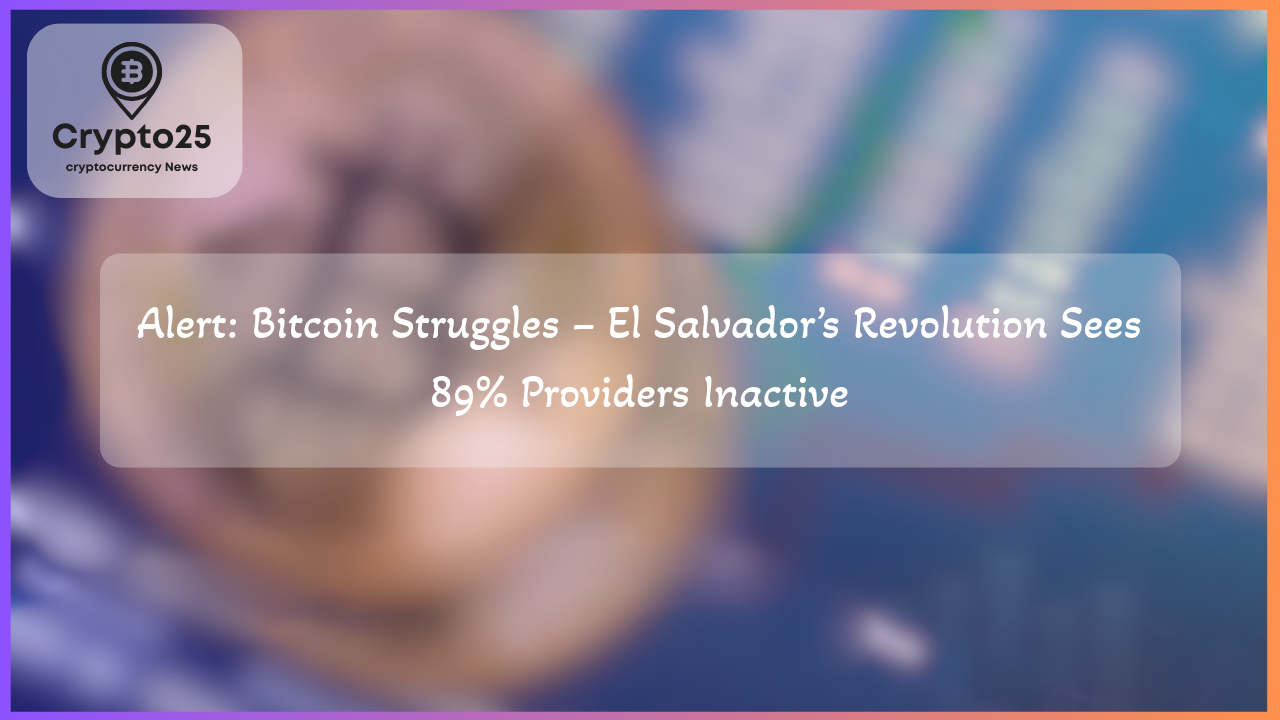
El Salvador’s bold move to embrace Bitcoin as legal tender in 2021 garnered global attention, positioning the nation as a pioneer in cryptocurrency adoption. However, despite initial enthusiasm, the country now faces significant challenges in sustaining its Bitcoin ecosystem, with the majority of registered Bitcoin service providers no longer active. This development raises questions about the long-term viability of El Salvador’s crypto-centric strategy.
## Bitcoin Service Providers in El Salvador: Declining Activity
Recent data from the Central Reserve Bank (BCR) highlights a stark decline among Bitcoin service providers in El Salvador. Out of 181 registered providers, an alarming 89% are now inactive. Specifically, 161 providers are classified as “non-operating,” with at least 22 failing to comply with critical regulations outlined in Article 4 of the Bitcoin Law Regulations. These regulations mandate adherence to anti-money laundering protocols, robust financial recordkeeping, and advanced cybersecurity standards.
This downturn has left only 20 providers actively operating in the country, including prominent platforms like the state-backed Chivo Wallet, Crypto Trading & Investment, and FinTech Americas. The situation poses significant challenges for sustaining the Bitcoin ecosystem, which was envisioned as a transformative force for the nation’s economy. This decline also raises broader concerns about the effectiveness of regulations and the long-term prospects of Bitcoin in El Salvador.
## President Bukele’s Controversial Bitcoin Strategy
Despite setbacks, President Nayib Bukele remains committed to Bitcoin and its underlying blockchain technology. El Salvador made history in 2021 as the first country to adopt Bitcoin as legal tender alongside the U.S. dollar. However, the decision was met with mixed reactions from global financial institutions. In 2023, following a $1.4 billion deal with the International Monetary Fund (IMF), El Salvador rolled back mandatory acceptance of Bitcoin and withdrew its legal tender status. This adjustment was partly influenced by the IMF’s recommendations to limit state involvement in Bitcoin policy.
Nevertheless, Bukele’s administration has continued to showcase its strong support for cryptocurrency. The government has acquired over 6,100 BTC, currently valued at more than $500 million. While this strategy appeals to Bitcoin advocates, critics argue that it risks inflaming tensions with the IMF and jeopardizing the country’s financial stability. The future of El Salvador’s crypto agenda depends on its ability to balance innovation with pragmatic fiscal policies, especially amidst global economic uncertainties.
## El Salvador’s Vision as a Technological Powerhouse
Beyond Bitcoin, President Bukele envisions a broader strategy to transform El Salvador into a regional technology hub. In March 2025, he engaged with prominent Silicon Valley investors, including Andreessen Horowitz co-founders Ben Horowitz and Marc Andreessen, to explore opportunities in artificial intelligence and tech development. The discussions revolved around creating a favorable environment for tech innovation, including a groundbreaking 0% tax policy for tech industries, regulatory incentives, and significant support for AI research and development.
As part of this forward-thinking vision, El Salvador has embarked on ambitious infrastructure projects such as the Bitcoin City Airport. Positioned as a gateway to “Bitcoin City,” this air transport hub aims to connect the country to international markets and bolster its tech-oriented economy. President Bukele has publicly championed this initiative, framing it as a cornerstone of the nation’s economic transformation. These developments underscore El Salvador’s efforts to reinvent itself as a haven for innovation and investment.
| Title | Details |
|---|---|
| Market Cap | $1.2 Trillion |
While El Salvador’s Bitcoin experiment has faced criticism and challenges, the country’s aspirations to establish itself as a tech hub signal a long-term commitment to innovation. Whether these efforts bear fruit remains to be seen, but it is clear that El Salvador is intent on positioning itself as a leader in the evolving global digital economy.
